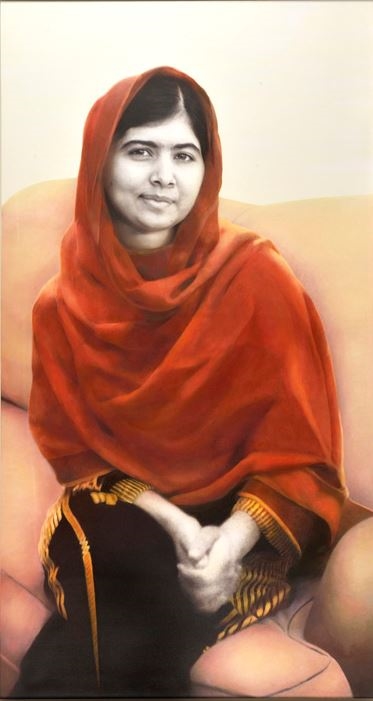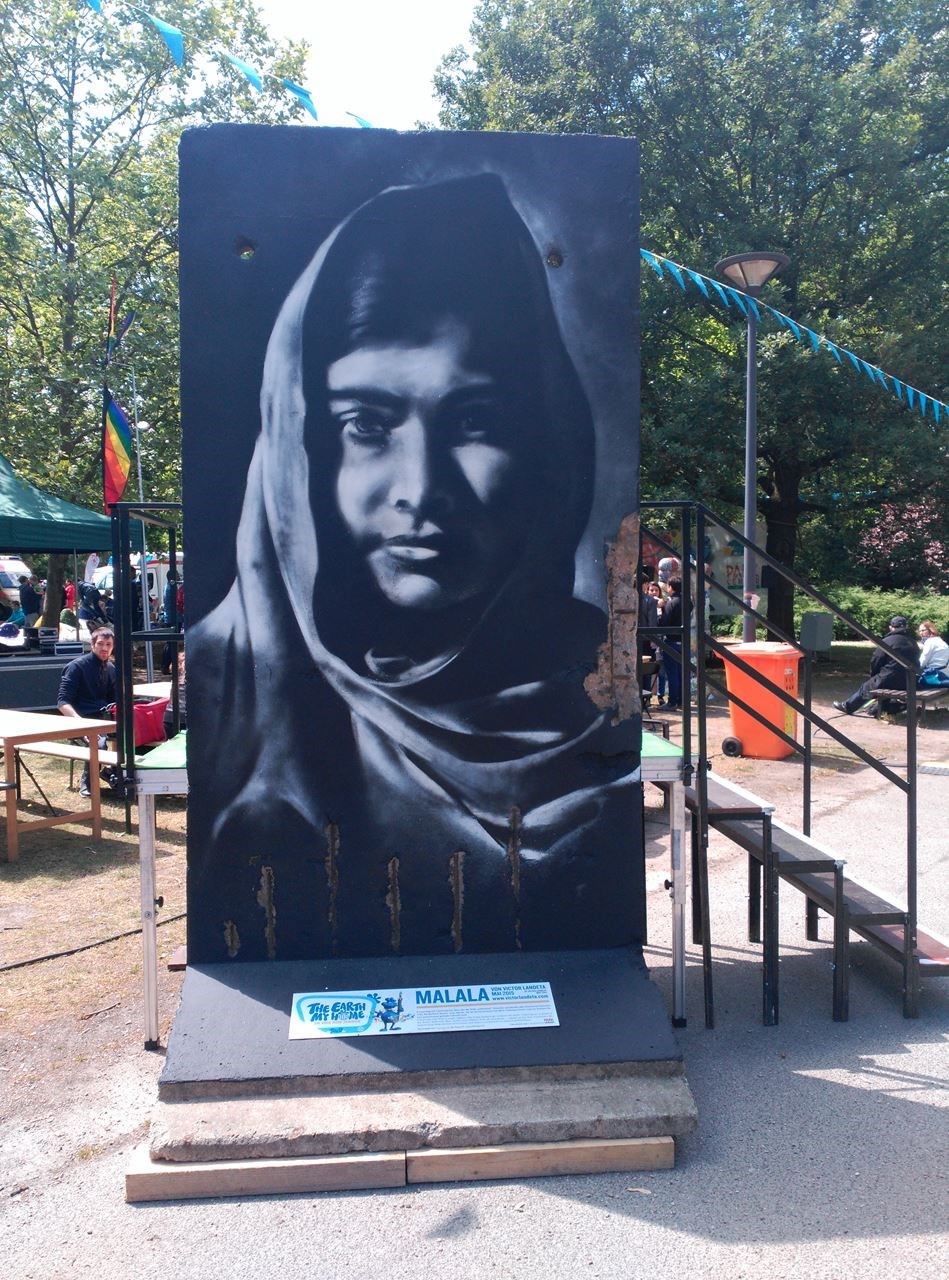Marvel Studios amassed $18.8 billion in revenue over the last decade from the wildly successful Avengers superheroes franchise (The Numbers). Clearly from this immense popularity, society often defines heroes as superhuman, those gifted with supernatural powers who fight evil and save the world. Society also commonly perceives heroes as those who donate large sums of money to charity, or celebrities with extravagant lives. Although these people may do good deeds, they do not always fit the definition of a true hero. Arthur Ashe, a prominent African American tennis player, states: “True heroism is remarkably sober, very undramatic. It is not the urge to surpass all others at whatever cost, but the urge to serve others at whatever cost” (Ashe). Those who seek solutions to problems for the betterment of society are true heroes. These same heroes are the ones that go down in history - those who are revered for their altruistic actions around the world.
 Malala YousafzaiWikimedia CommonsHeroes are not born into the morally superior and ethical people they are as developed adults. They often use their childhood experiences to shape themselves into the hero they want to be. Malala Yousafzai is one of these heroes that was able to use the first 11 years of her life to realize that she needed to fight out against the sexist standards being forced onto her. Yousafzai not only possesses the ability to be selfless and value others over herself, but also has learned to avoid the violence she knows is never the answer to conflict. Yousafzai was born July 12, 1997. She grew up in a rural area of Pakistan, called the Swat Valley. As she grew up, she took notice of the polar differences between the standards of boys and girls. Boys were free; they went to school, had fun, and didn’t do much work. Girls, however, were expected to stay home from an early age and do housework for the men. Appalled by this, she began to speak out with the help of her father. She began her activism work at the age of 11, writing on a BBC blog under the online pseudonym Gul Makai. Yousafzai later realized that the underlying cause of the oppressive restrictions on women was the Taliban, a terrorist organization. She chose to speak out against them, knowing full well the consequences it could hold. On October 9, 2012, she was shot in the head on her way to school at the age of 15 (Gale). Yousafzai is recognized by many as a modern hero and someone who possesses the traits of a hero. To be a hero, someone must possess the capability to be both selfless and peaceful under extreme pressure from many different sources. Yousafzai has all of these attributes – she values the life and well being of others over her own, and has not once resorted to the violence that has plagued her home country. Yousafzai is able to exemplify these qualities through her actions of activism and peaceful protest for women’s rights and education. Malala Yousafzai’s actions of altruism and remaining peaceful under pressure in stressful situations exemplify how she has stepped into the role of a modern hero.
Malala YousafzaiWikimedia CommonsHeroes are not born into the morally superior and ethical people they are as developed adults. They often use their childhood experiences to shape themselves into the hero they want to be. Malala Yousafzai is one of these heroes that was able to use the first 11 years of her life to realize that she needed to fight out against the sexist standards being forced onto her. Yousafzai not only possesses the ability to be selfless and value others over herself, but also has learned to avoid the violence she knows is never the answer to conflict. Yousafzai was born July 12, 1997. She grew up in a rural area of Pakistan, called the Swat Valley. As she grew up, she took notice of the polar differences between the standards of boys and girls. Boys were free; they went to school, had fun, and didn’t do much work. Girls, however, were expected to stay home from an early age and do housework for the men. Appalled by this, she began to speak out with the help of her father. She began her activism work at the age of 11, writing on a BBC blog under the online pseudonym Gul Makai. Yousafzai later realized that the underlying cause of the oppressive restrictions on women was the Taliban, a terrorist organization. She chose to speak out against them, knowing full well the consequences it could hold. On October 9, 2012, she was shot in the head on her way to school at the age of 15 (Gale). Yousafzai is recognized by many as a modern hero and someone who possesses the traits of a hero. To be a hero, someone must possess the capability to be both selfless and peaceful under extreme pressure from many different sources. Yousafzai has all of these attributes – she values the life and well being of others over her own, and has not once resorted to the violence that has plagued her home country. Yousafzai is able to exemplify these qualities through her actions of activism and peaceful protest for women’s rights and education. Malala Yousafzai’s actions of altruism and remaining peaceful under pressure in stressful situations exemplify how she has stepped into the role of a modern hero.
Malala Yousafzai’s activism for women’s education and choosing to help those in need exemplify her selflessness. Yousafzai struggled her whole life in Pakistan with sexist standards, she was valued less than boys, she was supposed to stay home and cook while the men worked, and she was societally inferior to men. She resented this, and she believed that she should be viewed as equal to men. She used this anger to fuel her passion and dedication, and channeled that passion to speak out against the oppressive reign of the Taliban. In her speech at the United Nations, where she was named UN Messenger of Peace, she states:
 Malala YousafzaiWikimedia CommonsSo here I stand … one girl among many. I speak – not for myself, but for all girls and boys. I raise up my voice – not so that I can shout, but so those without a voice can be heard. Those who have fought for their rights: Their rights to live in peace. Their right to be treated with dignity. Their right to equality of opportunity. Their right to be educated (Yousafzai).
Malala YousafzaiWikimedia CommonsSo here I stand … one girl among many. I speak – not for myself, but for all girls and boys. I raise up my voice – not so that I can shout, but so those without a voice can be heard. Those who have fought for their rights: Their rights to live in peace. Their right to be treated with dignity. Their right to equality of opportunity. Their right to be educated (Yousafzai).
In her speech, Yousafzai explains the importance of equal education for all and how everyone, no matter their gender or race, should be treated equally. She chooses to speak out for the well-being of others so they are able to have equal rights and be viewed as equals to everyone else in their society. When Yousafzai says this, she conveys how she chooses to use the power of her words to speak out against the limitations forced upon the women of middle eastern societies. Her choice to do this, even though she was aware of the dire consequences that would be inflicted on her by the Taliban exemplify how she places the needs of others so far ahead of her own, making her a true hero. The definition of selfless is: “concerned more with the needs and wishes of others than with one's own; unselfish” (Oxford). Yousafzai conforms with this definition perfectly, as all of her actions are driven by her desire to fight for the rights of others. In the same speech at a United Nations convention, Yousafzai again exemplified her ability to be altruistic and value others over herself. Yousafzai states: “Dear fellows, today I am focusing on women’s rights and girls’ education because they are suffering the most” (Yousafzai). Yousafzai substantiates here how she will always fight for those who are in need, and are not able to stand up for themselves. When Yousafzai says, “because they are suffering the most” (Yousafzai), it directly represents Yousafzai’s capability and choice to be selfless. She has chosen to fight for the rights of women’s education, and she almost paid the ultimate price for it. On October 9, 2012, a member of the Taliban boarded Yousafzai’s school bus and shot her in the head. She was able to survive, and kept on fighting after the attack on her. Although she nearly died, she viewed this as just another obstacle to overcome and was able to keep spreading her message after recovering. This directly aligns with her altruism, because she actively chose to value women’s right to an education over her own life. Throughout her life, Malala Yousafzai has struggled to fit in with the oppressive and brutal rule of the Taliban over her home country, Pakistan. Once she raised her voice and spoke out against them, pleading for equal educational rights for all, she had a target on her back. Even after coming back from severe gunshot wounds, Yousafzai continued to advocate for educational rights. This proves how Yousafzai embodies the definition of a hero - someone who fights for the greater good, no matter the cost it may have on themself.
Yousafzai’s ability to be peaceful is demonstrated throughout her career of dedicated activism in many different ways - her choice of peaceful protest and activism, and her ultimate forgiveness of those who have wronged her. One of the most important qualities of a hero is the ability to be peaceful. It is highly important for a person to be able to both negotiate and advocate peacefully, all while trying to help make the world a better place. Yousafzai’s ability to be peaceful is exemplified by Gale Biography In Context: “Yousafzai was recognized as a voice for children, education, and women's rights. Her father, too, defied fundamentalists by keeping his schools open, and he often received death threats … Yousafzai continued to write her blog, and later in 2009 she began speaking publicly.” (Gale). Yousafzai’s choice to protest the infringement of her rights as a Pakistani citizen asserts how she is peaceful because it shows how she does not resort to violence and continues to harness the power of her words. A hero who knows the power of peace will never resort to violence of any kind, just as Yousafzai has done. Yousafzai continues to again and again fight the oppressive reign of the Taliban using her words and her story to help the people of Pakistan and other developing countries acquire the rights they deserve. Again at Yousafzai’s speech after being awarded the title of UN Messenger of Peace, she conveyed the importance of what she was trying to accomplish and how she was doing it. Yousafzai states,
We realised the importance of pens and books when we saw the guns … The terrorists are misusing the name of Islam and Pashtun society for their own personal benefits. Pakistan is peace-loving democratic country… And Islam is a religion of peace, humanity and brotherhood. Islam says that it is not only each child’s right to get education, rather it is their duty and responsibility (Yousafzai).
In this speech, Yousafzai conveys how Islam is a peace-loving religion of brotherhood, showing that she values the importance of words many times over violence and hate speech. Yousafzai’s choice to dictate how Pakistan is a peace loving, diplomatic country exemplifies how she is peaceful because even though it is subjected to the oppressive ruling of the Taliban, she knows that with enough effort, anything she says she can make possible. Yousafzai states herself that Islam wants all children to receive an education, and is using that leverage to make it possible for those children to have an easily accessible, equal opportunity education. Across all of her activism work, Malala Yousafzai demonstrates multiple times how she values the power of peace and has never once resorted to hate speech or violence. This exemplifies how her ability and active choice to remain peaceful makes her a hero because she is ridding the world of violence and brutal oppression with the power of her words.
 Homage to Malala Yousafzai on the Berlin WallWikimedia CommonsMalala Yousafzai is considered a modern day hero by society due to her ability to remain both altruistic and peaceful in times of extreme tensions and conflict. Without these traits, Yousafzai would not be who she is as a person today. Although the Taliban resorted to violence to try to rid the world of Yousafzai’s progressive thoughts, Yousafzai persevered and still carries the same message today. I use Yousafzai as a role model because I often times find myself thinking how an action would affect myself above all else, and not how others would be affected by it. When I find myself in these situations where I am putting myself above others, I reflect and am able to remember how Yousafzai put others over herself even though the Taliban retaliated with violence for speaking out against them. Even though Yousafzai met extreme resistance against her progressive views on women’s rights, she still felt the urge to serve others, no matter the cost, and almost paid the ultimate price doing so. Yousafzai’s sheer dedication and determination to make the world a better place demonstrate how she is a true hero to modern day society. Her actions not only help people in developing countries, but inspire others to follow in her footsteps and do all they can to make the world a better place. That is what makes her a true hero.
Homage to Malala Yousafzai on the Berlin WallWikimedia CommonsMalala Yousafzai is considered a modern day hero by society due to her ability to remain both altruistic and peaceful in times of extreme tensions and conflict. Without these traits, Yousafzai would not be who she is as a person today. Although the Taliban resorted to violence to try to rid the world of Yousafzai’s progressive thoughts, Yousafzai persevered and still carries the same message today. I use Yousafzai as a role model because I often times find myself thinking how an action would affect myself above all else, and not how others would be affected by it. When I find myself in these situations where I am putting myself above others, I reflect and am able to remember how Yousafzai put others over herself even though the Taliban retaliated with violence for speaking out against them. Even though Yousafzai met extreme resistance against her progressive views on women’s rights, she still felt the urge to serve others, no matter the cost, and almost paid the ultimate price doing so. Yousafzai’s sheer dedication and determination to make the world a better place demonstrate how she is a true hero to modern day society. Her actions not only help people in developing countries, but inspire others to follow in her footsteps and do all they can to make the world a better place. That is what makes her a true hero.
Works Cited
“Box Office History for Marvel Cinematic Universe Movies.” The Numbers - Where Data and Movies Meet, www.the-numbers.com/movies/franchise/Marvel-Cinematic-Universe#tab=summary.
"Malala Yousafzai." Gale Biography in Context, Gale, 2012. Biography In Context, https://link.galegroup.com/apps/doc/K1650008545/BIC?u=powa9245&sid=BIC&xid=e37a7b62. Accessed 2 Apr. 2019.
“Selfless | Definition of Selfless in English by Oxford Dictionaries.” Oxford Dictionaries | English, Oxford Dictionaries, en.oxforddictionaries.com/definition/selfless.
Yousafzai, Malala. “Malala’s Speech At the UN.” United Nations Convention. 12 July 2013.
Page created on 5/21/2019 4:03:08 AM
Last edited 9/8/2019 11:24:52 PM
